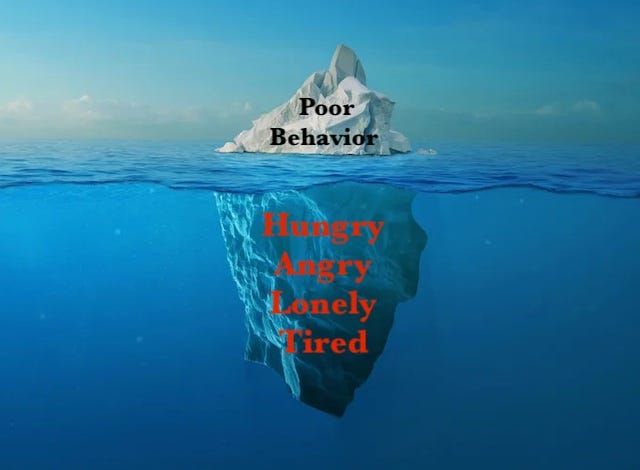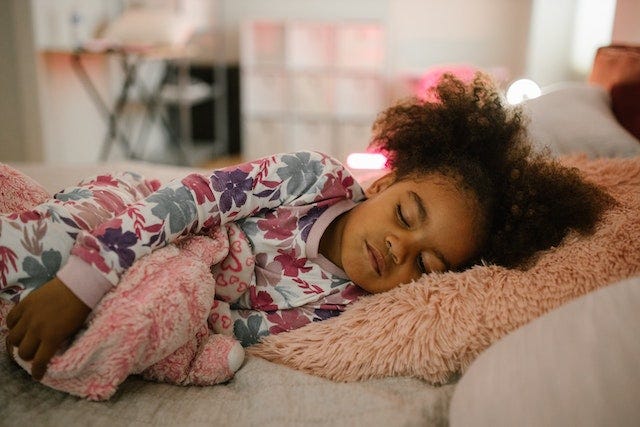4 big reasons kids misbehave and the easy ways to prevent it.
(Just knowing why takes the sting out of it)
The Art and Science of Parenting #51
By: Catherine Lynch and Glenn Collins
Dear Awesome Parent,
Behavior. That’s where the rubber meets the road, right? That’s what we’re all trying to change, for lots of reasons. Please enjoy our first post on behavior, where we dive into some of the major reasons WHY kids behave the way they do and some surprisingly easy ways to make big changes in your kid’s behavior.
Wednesdays…Keep an eye on your inbox…it’s entirely possible we’ll be putting out a mid-week edition of the Art and Science of Parenting that highlights thought-leaders in parenting and a few surprises!
FYI: Some ppl aren’t getting our newsletter - it’s ending up in their junk folder : ( To prevent that from happening to you, Just hit reply and say hi. That way the algorithm knows you want to continue to get our newsletter.
Do your kids misbehave?
Ours certainly do. I clearly remember one teenage son walking by the other and smacking him on the head. Unprovoked. And it happened All. The. Time. No amount of “Be kind to your brother” helped. Neither did “In this house we don’t hit people”. Sighing.
When our kids and grandkids misbehave, we want to know why. We’re not satisfied with just seeing the surface behavior, we want to know the root cause. Why did they do that? There’s a reason. We want to understand. A mystery to be solved and we’re the detectives. Why does our kid do what he does?
People do what they do for all kinds of reasons. So many, in fact, there’s an entire field of study around it - Psychology. Don’t worry though, we’re not going down that rabbit hole. At least, not today. 😉
Today we’ll start with H.A.L.T., an acronym that reminds us of 4 common reasons for poor behavior:
Hungry, Angry, Lonely, Tired.
Note: We did not create this excellent acronym - it comes from Alcoholics Anonymous where it’s used to spot relapse triggers. It’s highly useful for identifying triggers for behaviors in us and our kids, too.
There are lots of reasons your kids misbehave. While H.A.L.T. is not the answer to all of them, it’s frequently an underlying cause. It can be an easy fix and it’s easy to remember. A meltdown averted by a snack. A bad mood cured by a smile, a hug, and some quiet time. A seemingly unsolvable issue evaporates after a good night’s sleep.
H is for hungry.
We completely underestimate how much energy the brain uses…. When your kids’ blood sugar drops they’re easily frustrated and irritable. Things they easily cope with when well fed can spiral into a complete meltdown when they’re hungry. In fact, someone loosing it because they’re hungry is so common that it has its own name: Hangry. 😆
Ask yourself:
Does my kid melt down in the hour before dinner? Or is mid-afternoon the problem?
Do I make sure there’s protein, fat, and fiber available for most meals and snacks, instead of just carbs that burn off so quickly, and they love so much?
Is my kid good at telling me when they’re hungry, or do I have to figure it out myself because they’re in a bad mood or I know it’s been awhile since they’ve eaten?
Action Steps:
Keep your kid’s favorite snacks on hand at all times. (You probably already do this 😃). Bonus points if you can get them to eat and like foods that having staying power - protein, fat, and fiber.
Work with your kid on mood awareness and body awareness. If they can learn to listen to their bodies and detect hangry before they reach the meltdown stage, that skill that will serve them for life.
Model the skills you want your kid to have. When you’re feeling irritated or negative, ask yourself: “Am I hungry? Has it been awhile since I’ve eaten?” If so, have a snack and tell your kid what just happened.
A is for angry.
While your kid may not be obviously angry, there have probably been multiple incidents that irritated them recently. Issues that weren’t resolved. Incidents that fester. Or they feel wronged. Something unfair happened, and you may not know about it.
Ask yourself:
Is my kid good at telling me when something is irritating him, or do they keep their problems to themself?
What are the warning signs that they’re headed towards an outburst?
What works best to help my kid get out of an angry mood? Time alone? Distraction with toys, activities or other people? Talking about it?
Action Steps:
Talk about emotions with your kid. Their favorite character’s emotions in books and TV. Their pets emotions. Their own emotions. Your emotions. Identifying emotions is the first step in being able to manage them. This is Emotional Intelligence 101.
Model the behavior you want to see. Tell them how you calm yourself down. Be specific: “Today at work my boss yelled at me and I was really angry. I took a break and walked around outside for a few minutes to calm down.”
Help them come up with a list of things they can do to calm down when they’re angry. (Don’t assume what works for you will work for your kid.)
L is for lonely.
We all have an inborn need to connect with others. Particularly with those we’re close to like friends and family. While your kid might not admit to being lonely, they may need connection. For example, after a long day away from you, after a stressful event, or after seeing you give attention to siblings.
Ask yourself:
Has my kid had a meaningful connection recently with an adult they’re close to?
Does my kid feel alone, misunderstood, or excluded from something today?
Did anything happen today that my kid needs to tell me about?
Action Steps:
Make “friendly” your default setting so it’s easy for them to come to you when they’re lonely and need to connect.
Model naming your feeling and doing something about it. “I’m feeling lonely. Can I get a hug/hang out with you?”
Invite your kid to do something fun with you.
T is for tired.
We adults completely underestimate how much sleep kids need and how much energy they use in the course of a typical day. They’re little energizer bunnies one minute, and completely zonked out the next. Experts recommend 10-13 hours of sleep for pre-schoolers, 9-11hours for school age kids, and 8-10 hours for teens. Remember this: just because they’re in bed for the recommended number of hours doesn’t mean they got that much sleep.🤣
And if your kid is running around like normal - that doesn’t mean they’re not tired. Kids often keep going due to adrenaline and lack of awareness of how they feel.
Devices are also an issue, not just due to their blue-light, but also because they’re just so engaging and hard to put down. It’s often difficult for them to resist “one more game”, “just one more video”, or “just a few more minutes”. Suddenly it’s 2AM and they’re still at it.
Ask yourself:
Is my kid getting the recommended amount of sleep for their age?
Are they talking to siblings, playing with toys, or on a device instead of sleeping?
Is their room dark enough and quiet enough?
Action Steps:
Create a bedtime routine. Routines are calming to kids because they know what to expect. Set a realistic bedtime you can stick to most nights.
Maximize their chances of a good night’s sleep by minimizing noise and light, and keep the bedroom a comfortable temperature.
Consider a “no devices in the bedroom after lights out” policy.
Home practice:
Recall a recent incident where your kid didn’t behave as well as you thought they could or should. Now look at it through the lens of H.A.L.T and ask yourself (and your spouse) if it’s possible your kid was Hungry, Angry, Lonely or Tired. Dig deep and let us know what you come up with.
Our 6th through 10th Newsletters...are now available on Substack!
In our continuing efforts to publish our first 20 newsletters to Substack that were previously published on a different platform, here’s links to the next batch of 5.
Issue 9: 90 years of resentment, A cucumber throwing monkey, and a Sun Halo
Catherine and a soft shelled turtle
It’s turtle breeding season here in Florida, and that means the soft shell turtles are looking for a safe place to lay their eggs. This sweet young lady had laid her eggs across the road and was headed back to her pond. She was looking tired and taking a break beside the house so Catherine gave her a lift down to the water. When she smelled the water she wanted down and we couldn’t believe how fast she ran back into the pond. And yes, “ran” is the right word! Also, just so you know, we are #wordnerds, so there was a lot of discussion about whether she was a turtle or a tortoise.







